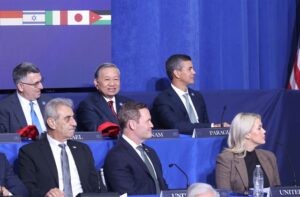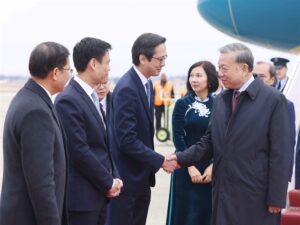Prime Minister Chính Chairs Conference on International Integration Steering Committee

Hanoi, The Gulf Observer: Prime Minister Phạm Minh Chính, Head of the National Steering Committee on International Integration, on Tuesday chaired a conference in Hanoi to officially launch the committee, review the country’s international integration efforts, and outline future directions and tasks.
In his address, the Prime Minister called on members of the Steering Committee to uphold the highest sense of responsibility in their assigned roles, ensuring that the committee fulfils the objectives set forth in the Party’s resolutions and the State’s policies on international integration. He praised the Ministry of Foreign Affairs for promptly drafting the Government’s action programme to implement the Politburo’s Resolution 59 on international integration in the new context, as well as for preparing a proposal to the National Assembly on special mechanisms and policies to accelerate its implementation.
The Prime Minister stressed that international integration has significantly contributed to maintaining a peaceful and stable environment for national development, particularly amid today’s global uncertainty and complexity. Since the adoption of Resolution 59, Vietnam has expanded and upgraded its network of partners, strengthened bilateral relations, enhanced cooperation across sectors, and deepened political trust and shared interests. The country now enjoys comprehensive partnership relations or higher with 38 countries worldwide.
Highlighting the economic achievements, the Prime Minister noted that international integration has become a key driver of Vietnam’s internal strength and development. Despite global headwinds, Vietnam’s GDP grew 7.52 per cent in the first half of 2025. Export turnover in the first seven months exceeded US$514 billion, while registered and disbursed foreign direct investment (FDI) reached $24.1 billion and $13.6 billion respectively, ranking Vietnam among the world’s top 15 developing economies in FDI attraction.
International integration has also advanced institutional reforms, translating international commitments into practice and strengthening Vietnam’s role, voice, and position on the global stage. Ministries, agencies, and localities across the country have increasingly engaged proactively in these efforts.
Reflecting on achievements and challenges, the Prime Minister underscored three lessons for future integration: combining national strength with global trends, coordinating diplomacy with other pillars of integration, and placing human development at the centre.
He called for the continued implementation of Resolution 59, especially new approaches and strategies adapted to current realities, and urged the swift finalisation of a National Assembly resolution on special mechanisms and policies to facilitate integration. Relevant ministries, including Foreign Affairs, Industry and Trade, and Home Affairs, were tasked with working closely with the Steering Committee members to develop concrete work plans within their fields of responsibility.
The Prime Minister also instructed acceleration of preparations for major international integration activities in 2025, including the signing of the UN Cybercrime Convention in Hanoi, the finalisation of APEC 2027’s organisational structure, and the effective participation of Vietnamese leaders in key multilateral events such as the UN General Assembly, ASEAN Summit, APEC, and G20.
He emphasised the need for rigorous implementation and monitoring of international commitments made during high-level diplomatic engagements, urging ministries, agencies, and localities to actively address obstacles to ensure effective execution.
Expressing confidence in the determination of ministries, agencies, and localities, the Prime Minister affirmed that international integration must be embraced as a shared responsibility of the entire political system and people, in accordance with Resolution 59’s principle that integration is the cause of all Vietnamese.


